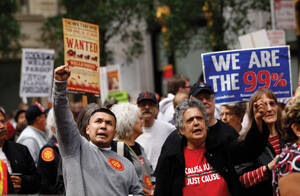When the Rev. Robert Rien, flanked by the staff of St. Ignatius of Antioch Parish, showed up at the Bank of America branch in Antioch, Calif., in 2009 to close out the church’s account—all of $135,000—the only thing on his mind was the plight of two dozen families in his flock struggling with their mortgages against the $2.3 trillion behemoth.
“We know it wasn’t much,” he said of the parish’s savings. “But it sent a message and it started a movement.”
Creating a movement was hardly on the minds of the parish council members who approved the divestment. They simply wanted to see the parish’s cash assets invested locally to help their middle-class city of 102,000 residents, Father Rien said. But word of the divestment spread quickly. Following the parish’s lead, religious congregations have withdrawn about $40 million nationwide from the country’s largest banks, said Tim Lillienthal, lead organizer with the PICO National Network, the largest faith-based organizing group in the United States.
“We’re trying to get the banks to listen to us to try to keep people in their homes,” Lillienthal said. The campaign to boost bank accountability has gained wider awareness across the country as hundreds of faith-based and grass-roots organizations began working alongside the Occupy Wall Street movement. The groups have succeeded in calling attention to executive compensation, secrecy in financial dealings and the banks’ lobbying efforts to water down rules governing financial reform under the Dodd-Frank Wall Street Reform and Consumer Protection Act passed in 2010.
One of the longest-running efforts to focus on banking accountability has operated with much less public attention. Several faith-based coalitions that promote socially responsible investment have challenged corporate decision-making through shareholder resolutions and public statements calling for transparency in financial dealings and justice for bank customers.
Seamus Finn, an Oblate priest who is a member of the board of directors of the Interfaith Center for Corporate Responsibility, said all the tactics are meant to get the attention of corporate officials about questionable business practices. Father Finn, who planned to present resolutions during the annual meetings at JP Morgan Chase and the investment firm of Goldman Sachs in May, said the massive bank lobbying effort to minimize the impact of Dodd-Frank on trading and investment practices is high on the list of concerns being raised with corporate C.E.O.’s.
Citigroup officials and shareholders meeting in Dallas on April 17 were confronted with those questions by Susan Mika, a Benedictine sister who is executive director of the Socially Responsible Investment Coali-tion based in San Antoni, Tex. Sister Mika charged that the company was “spending enormous amounts of money to stall the rulemaking process” under Dodd-Frank. The questions helped Citigroup’s shareholders issue a vote of no confidence to the bank’s executive compensation plan.
Sister Mika said she told Citigroup officials, “We’ve engaged you [for] many years and we’re not going away.”








